Remington Premier Bismuth Waterfowl 12 Gauge 2.75" #5 1.25 oz – 25rds – R20505 For Sale
$51.09
The Remington Premier Bismuth Waterfowl 12 Gauge ammunition is designed to enhance hunting performance with its superior density and impact range, suitable for any shotgun or avian target. Featuring HEVI BISMUTH, it offers higher density than standard steel, allowing for extended shooting distances without sacrificing energy and effectiveness. The use of smaller shot sizes increases pellet count per payload, improving shot precision and the likelihood of successfully hitting targets and meeting bag limits. Ideal for diverse hunting environments, such as open prairies and flooded timber, this cost-effective ammunition is tailored for both upland game and waterfowl hunting, offering consistently outstanding results.
Can you shoot bismuth at waterfowl?
Yes, you can shoot bismuth at waterfowl. Bismuth shot is non-toxic and is considered an acceptable alternative to lead shot for hunting waterfowl, as lead is banned in many areas due to its environmental and health risks. Always check local regulations to ensure compliance with legal hunting practices.
Why are bismuth cartridges so expensive?
Bismuth cartridges are often more expensive than other types of ammunition due to several factors:
1. **Material Cost:** Bismuth is more expensive than lead, which has traditionally been used in ammunition. The production costs of bismuth as a raw material contribute to the higher price of the final product.
2. **Manufacturing Process:** The process of creating bismuth cartridges is more complex. Bismuth is generally softer and more brittle than lead, requiring careful handling and sometimes additional steps to ensure safety and performance during manufacturing.
3. **Regulatory Compliance:** Bismuth is often used as a non-toxic alternative to lead in environments where lead is restricted due to environmental and health regulations. The production of non-toxic ammunition that meets these regulatory standards can incur additional costs.
4. **Supply and Demand:** Bismuth is less abundant than lead, and its supply chain is not as developed. Reduced availability can lead to higher prices. Furthermore, as demand for non-toxic shot increases, this can also push up prices.
5. **Niche Market:** Bismuth cartridges are often marketed as a premium product for specific hunting and shooting needs, allowing manufacturers to charge a premium price compared to more common and widely used materials.
These factors combined contribute to the higher price of bismuth cartridges compared to other types of ammunition.
Is bismuth better than lead?
To determine whether bismuth is “better” than lead depends on the context in which you are comparing the two elements, as both have different properties and uses:
1. **Toxicity:** Bismuth is generally considered less toxic than lead. Bismuth compounds are often used in pharmaceuticals and cosmetics, whereas lead is known for its toxicity and health risks.
2. **Environmental Impact:** Bismuth is more environmentally friendly compared to lead, which can cause significant environmental harm if not properly managed.
3. **Applications:**
– **Lead** is used in batteries, radiation shielding, and historically in paints and pipes (though its use in these areas has decreased due to toxicity concerns).
– **Bismuth** is used in cosmetics, pharmaceuticals, and as a lead replacement in free-machining alloys and solders.
4. **Physical Properties:**
– Lead has a low melting point, high density, and good corrosion resistance, making it useful in certain applications.
– Bismuth has a lower density than lead, is non-toxic, and is used to make alloys with low melting points.
5. **Cost and Availability:** Generally, lead is more abundant and cheaper than bismuth, which can influence its use in industrial applications.
In summary, bismuth is considered “better” than lead in terms of toxicity and environmental impact, while lead may be preferred for certain applications where its specific properties or cost-effectiveness are required. The evaluation of which is “better” ultimately depends on the specific use case and what properties are most valued.
Is TSS better than bismuth?
The question of whether TSS (Tungsten Super Shot) is better than bismuth depends on the context in which they are used, particularly in hunting or shooting scenarios.
1. **Density and Performance**: TSS is known for its higher density compared to bismuth, which generally means it retains more energy at longer ranges and can penetrate targets more effectively. This can make it a superior choice for applications requiring maximum lethality and range.
2. **Cost**: TSS is generally more expensive than bismuth. This can be a significant factor for hunters and shooters concerning budget and cost-effectiveness.
3. **Environmental Impact**: Both TSS and bismuth are considered more environmentally friendly than lead. However, tungsten, which comprises TSS, is more inert and less toxic than bismuth, potentially making it a better choice from an environmental standpoint.
4. **Shotgun Compatibility**: Bismuth, being softer than TSS, is often favored for use in older shotguns not rated for steel shot as it is less likely to damage barrels. TSS, being much harder, requires more modern firearms designed to handle such material.
In conclusion, TSS offers superior performance in terms of density and range, potentially making it the better choice for certain hunters. However, factors like cost, shotgun compatibility, and specific hunting needs may lead others to prefer bismuth.
Can I shoot bismuth through a full choke?
Yes, you can shoot bismuth through a full choke. Bismuth is softer than steel, making it safe for use in older shotguns and those with tighter chokes, such as a full choke. However, it is always advisable to consult your shotgun’s manufacturer guidelines to ensure compatibility with specific ammo types.
What is the only legal gun that can be used to take waterfowl?
The only legal gun that can be used to take waterfowl in the United States is a shotgun. It must be no larger than 10-gauge and must be capable of holding no more than three shells, unless it is plugged with a one-piece filler that limits it to three shells. This regulation is part of federal migratory bird hunting regulations.
Can you shoot bismuth in old shotguns?
Yes, you can typically use bismuth shot in old shotguns. Bismuth is softer and less dense than lead, making it a suitable alternative for use in older shotguns with barrels that might not handle the harder steel shot well. However, it’s always a good idea to check the specific shotgun’s manufacturer recommendations and possibly consult a gunsmith to ensure compatibility with your particular firearm.
How much does a pound of bismuth cost?
As of the latest available data, the price of bismuth can fluctuate due to market conditions, but it generally ranges between $5 to $10 per pound. For the most current price, it’s advisable to check a reliable commodities market source or a supplier specializing in metals.
What size bismuth shot for geese?
For hunting geese, it’s recommended to use larger bismuth shot sizes for effectiveness. Sizes such as BB (0.18 inches) or BBB (0.19 inches) are commonly recommended for geese to ensure sufficient knockdown power and range. However, always check local regulations and guidelines as they may vary.
Can you mix lead and bismuth?
Yes, lead and bismuth can be mixed together. They form an alloy that is often used for various applications, such as low-melting-point materials and in some types of ammunition. The mixing process involves melting both metals and combining them in the desired proportions.
What size shot of bismuth to lead?
The size comparison between bismuth shot and lead shot usually involves selecting a size one size larger when using bismuth to achieve similar performance to lead. For example, if you typically use No. 5 lead shot, you might opt for No. 4 bismuth shot. This adjustment accounts for the difference in density between the materials, as bismuth is less dense than lead. However, performance can also vary based on other factors, so it’s important to consider your specific needs and test accordingly.
What is a cheap alternative to lead shot?
A cheap alternative to lead shot is steel shot. Steel is widely used as a substitute due to its affordability and non-toxic nature, making it environmentally friendly compared to lead. It is commonly used in hunting and shooting sports, especially in regions where lead shot is banned or restricted due to environmental concerns.
Can you shoot bismuth through Carlson choke tubes?
Yes, you can shoot bismuth through Carlson choke tubes. Bismuth is a softer metal compared to steel, making it safe to use with Carlson choke tubes, which are designed to handle a variety of shot types, including lead, bismuth, and steel, provided you follow the manufacturer’s guidelines.
Is bismuth shot safe in old shotguns?
Bismuth shot is generally considered safer than steel shot for use in older shotguns. Older shotguns, particularly those with full chokes or made with softer barrel materials, can be damaged by the hardness of steel shot. Bismuth, being softer and more similar in density to lead, poses less risk of damaging the barrels. However, it is still important to check the specific recommendations of the shotgun manufacturer or consult a gunsmith, as the condition and specifications of individual shotguns can vary.
What type of shot is illegal when hunting waterfowl in the US?
The use of lead shot is illegal when hunting waterfowl in the United States. Non-toxic alternatives such as steel, bismuth, or tungsten shot must be used instead to prevent environmental contamination and harm to wildlife.
Be the first to review “Remington Premier Bismuth Waterfowl 12 Gauge 2.75" #5 1.25 oz – 25rds – R20505” Cancel reply
Related products
Remington Premier Bismuth Waterfowl
Remington Premier Bismuth Waterfowl 28 Gauge 2.75" #4 0.87 oz – 25rds – R20513
Remington Premier Bismuth Waterfowl
Remington Premier Bismuth Waterfowl 12 Gauge 3" #5 1.37 oz – 25rds – R20501
Remington Premier Bismuth Waterfowl
Remington Premier Bismuth Waterfowl .410 Gauge 3" #4 0.56 oz – 25rds – R20514
Remington Premier Bismuth Waterfowl
Remington Premier Bismuth Waterfowl 12 Gauge 3" #2 1.37 oz – 25rds – R20500
Remington Premier Bismuth Waterfowl
Remington Premier Bismuth Waterfowl 12 Gauge 2.75" #2 1.25 oz – 25rds – R20503
Remington Premier Bismuth Waterfowl
Remington Premier Bismuth Waterfowl 20 Gauge 3" #5 1.25 oz – 25rds – R20508
Remington Premier Bismuth Waterfowl
Remington Premier Bismuth Waterfowl 16 Gauge 2.75" #4 1.12 oz – 25rds – R20511
Remington Premier Bismuth Waterfowl
Remington Premier Bismuth Waterfowl 20 Gauge 2.75" #5 0.87 oz – 25rds – R20509
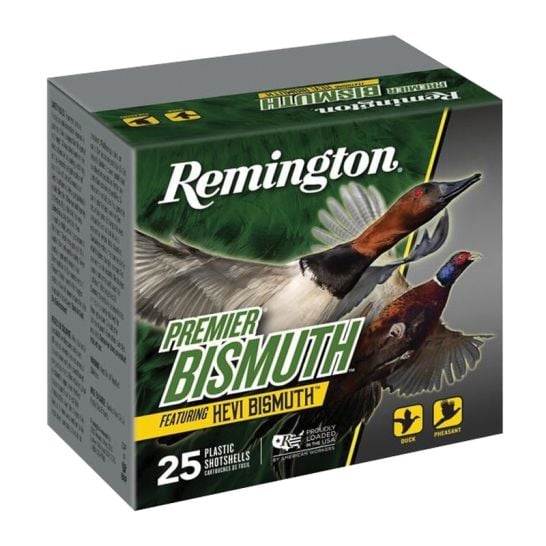
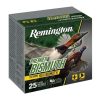
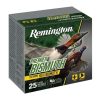
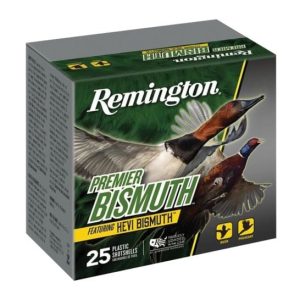
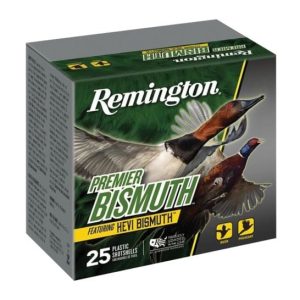
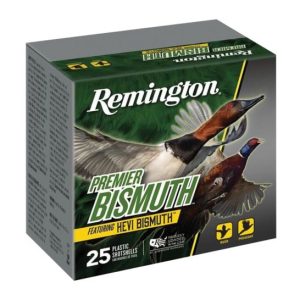
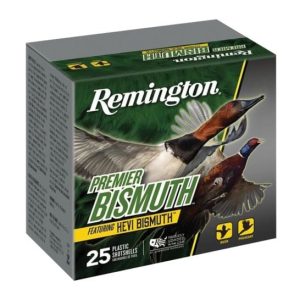
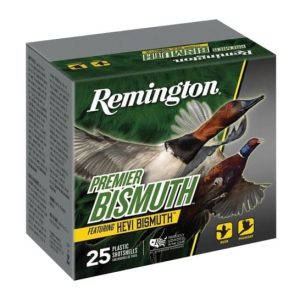
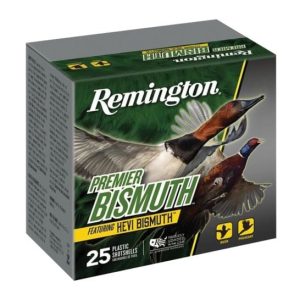
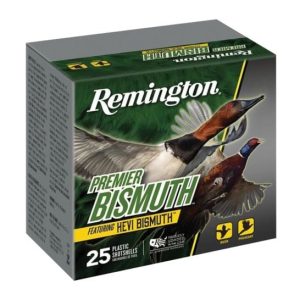
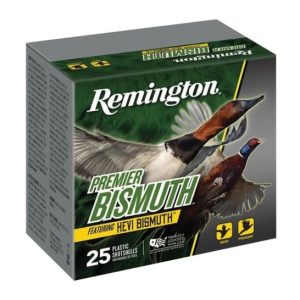
Reviews
There are no reviews yet.